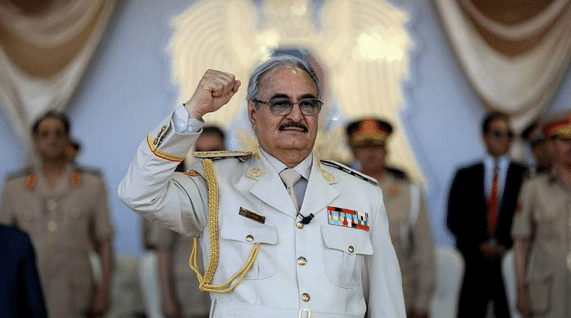
To be blunt, Khalifa Haftar, once a friend of Colonel Muammar Gaddafi and long a prominent figure in Libyan affairs, has been trying to overthrow the recognized government of his country and set himself up as its leader. A year ago he seemed on the brink of succeeding, and was apparently within days of capturing the capital, Tripoli. That never happened – and now it seems an unlikely possibility. Why has the wind gone out of his sails, and can he ever recover the momentum that carried him to within an inch of success?
Ever since Gaddafi, Libya’s president for some 40 years, was deposed in 2011, the country has become a hotbed of disparate Islamist groups battling against each other. In 2015 under a UN-led initiative an interim Government of National Accord (GNA) was established. It
was unanimously endorsed by the UN Security Council as the sole legitimate executive authority in Libya. It proved totally ineffective in its attempts to get a grip on the situation. On the contrary, it allowed the mayhem to spiral out of control. Chaos ruled in Libya until the autumn of 2019.
Then, in October, Turkey came forward with an offer of assistance. Ever since, boosted by Turkey’s state-of-the-art military technology, the GNA has chalked up a series of successes against its main opponent, the Libyan National Army (the LNA), led by Khalifa Haftar.
Until quite recently an impressive list of national governments have believed that Haftar is the one politico-military figure in today’s Libya possibly able to regain mastery of the situation and bring an end to the state of anarchy. That does not mean that he is considered a particularly admirable or attractive character, merely that he appears to have the power and leadership qualities that Libya seems to require at the present time.
As a young army officer in 1969. Khalifa Haftar helped Gaddafi seize power from King Idris, but in the 1980s, following a failed campaign to annex part of Chad, he had a major falling out with the Libyan dictator. Haftar fled to the US, from where he spent twenty years planning Gaddafi’s overthrow.
The BBC finds it significant that Haftar took up residence in the state of Virginia. “His proximity to the CIA’s headquarters in Langley,” remarks the BBC on-line, “hinted at a close relationship with US intelligence services, who gave their backing to several attempts to assassinate Gaddafi.”
When the final uprising against Gaddafi began in 2011, Haftar returned to a disintegrating Libya and re-established his control of the LNA. In the following years jihadists of various hues viewed Libya as a happy hunting ground. By February 2016 the LNA had pushed the jihadists out of much of Benghazi, and by mid-April they had been dislodged from their strongholds surrounding the city.
In April 2019 Haftar announced his intention to seize the capital, Tripoli. He mobilized his forces and began a march on the city. The GNA launched air attacks air attacks against his forces. The UK arranged for an emergency Security Council meeting, which called on Haftar to “halt all military advances” – a call he ignored.
Haftar has powerful friends. During the years of conflict that led to what now seems a bid for supreme power, he received backing and military support from a variety of international sources. These include Russia and France, both of which urged the Security Council to exert minimal pressure on Haftar and his LNA. Other states underwriting Haftar included Egypt, the UAE, Saudi Arabia and Jordan.
In short, it is clear that a significant group of nations regarded Haftar not as Libya’s problem, but as its solution. Their confidence in him may have been shaken by recent events. His campaign seems to have become log-jammed. The support that Turkey is providing to the GNA has undoubtedly resulted in a number of reverses for Haftar and his military forces.
A full year has passed since Haftar began his advance on Tripoli. The task of actually capturing the capital proved a great deal more difficult than he had envisaged. While the continuing conflict claimed some 1000 Libyan lives, the GNA managed to hold Haftar and his LNA at bay month after month. Then came the strengthening of government forces under the agreement with Turkey. Finally on May 18, 2020, after weeks of fighting, GNA forces recaptured the al-Watiya airbase south of the capital – a strategic stronghold that had been under Haftar’s control since 2014. Two days later Haftar’s forces were chased out of two towns near the Tunisian border, Bader and Tiji
The loss of the al-Watiya airbase, one of Haftar’s main fortresses in western Libya, is a significant blow to his effort to seize the capital, and shifts the balance of power in favour of the Turkey-supported GNA. Haftar had been using the base as a launching pad for attacks on government forces across western Libya, and has now been deprived of that strategic asset.
While not exactly on the run, Haftar’s position has been considerably weakened. The question now is whether his formidable supporters will come to his aid. President Putin is no friend of NATO, but is he likely to involve Russia in an all-out proxy war against NATO member Turkey on Libyan soil? Are France, Germany, or the UAE? Some limited support and assistance might be on offer, but would that be enough for Haftar to recover and regain the initiative? Or has his gamble to take over the leadership of Libya failed?

